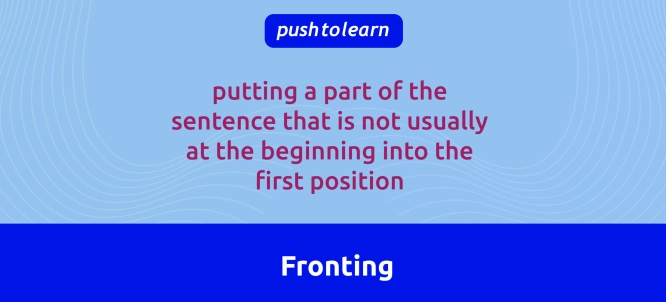by PushtoLearn
Fronting
Table of Contents
Fronting – Exercises
These exercises focus on Fronting
What is Fronting?
Fronting means putting a part of the sentence that is not usually at the beginning into the first position. This change is used to emphasize the word or phrase moved to the front.
For example:
-
Normal sentence: I found the keys in the drawer.
-
With fronting: In the drawer, I found the keys.
By fronting "in the drawer," we emphasize the location where the keys were found.

Rules of Fronting
1. Adverbials
Adverbs or adverbial phrases can be moved to the front of a sentence to emphasize time, place, or manner.
-
Normal: She speaks quietly in the library.
-
With fronting: In the library, she speaks quietly.
2. Objects
Direct objects can also be fronted for focus.
-
Normal: I will never forget that moment.
-
With fronting: That moment, I will never forget.
3. Negative Expressions
When using negative adverbs like "never," "rarely," or "not only," fronting is common.
-
Normal: I had never seen such a view.
-
With fronting: Never had I seen such a view.
4. Comparative Phrases
Phrases starting with "more," "less," or similar comparative words can be fronted.
-
Normal: You will not find a better deal anywhere.
-
With fronting: Nowhere will you find a better deal.
5. Conditionals (Optional Inversion)
In conditional sentences, fronting may involve inverting the subject and auxiliary verb.
-
Normal: If I had known, I would have helped.
-
With fronting: Had I known, I would have helped.
Common Errors in Fronting
|
Error |
Example |
Corrected Sentence |
|
Missing verb inversion |
Never I saw such beauty. |
Never have I seen such beauty. |
|
Incorrect emphasis placement |
That cake, I don’t like it. |
That cake, I don’t like. |
|
Fronting without a clear reason |
Beautiful, it was the sky. |
Beautiful was the sky. |
|
Overusing fronting |
Every sentence, he starts with fronting. |
He starts every sentence with fronting. |
Normal Word Order vs Fronted Version
|
Normal word order |
Fronted version |
Why front? |
|
Adverbial (time) We met yesterday evening. |
Yesterday evening, we met. |
Sets the time frame first, gives it emphasis. |
|
Adverbial (place) I found the keys in the garage. |
In the garage I found the keys. |
Highlights the location, useful after the question “Where?” |
|
Object I love classical music. |
Classical music I love. |
Adds dramatic focus (common in speech, advertising, literature). |
|
Complement The best solution is this one. |
This one is the best solution. |
Puts the important item first. |
|
Negative adverbial I had never before seen such chaos. |
Never before had I seen such chaos. |
Negative fronting triggers subject–auxiliary inversion; adds formality. |
|
Frequency adverbial He rarely speaks in public. |
Rarely does he speak in public. |
Same inversion rule; gives stylistic weight. |
|
Conditional phrase If I had known, I would have called. |
Had I known, I would have called. |
Inverted conditional without if; formal or literary style. |
|
Comparative clause If it’s colder, we’ll stay inside. |
Should it get colder, we’ll stay inside. |
Fronted should = more formal, concise. |
|
Result clause (so + adjective) |
So good was the film that I cried. |
Fronted so + adjective for emphasis (formal/literary). |
|
Reason clause (such + noun) She is such a talented pianist that everyone applauds. |
Such a talented pianist is she that everyone applauds. |
Formal, rhetorical emphasis. |
Everyday Use of Fronting
Fronting is more common in formal writing or speech but can be used in casual conversation for dramatic effect or storytelling. Here are some examples:
-
Storytelling: Down the hill rolled the ball.
-
Dramatic effect: What a view it was!
-
Formal speech: With great power comes great responsibility.
Example Sentences
-
In the kitchen, you will find the utensils.
-
Rarely does he smile during meetings.
-
This problem, we must solve immediately.
Emphasis in sentences can be added in different ways. You can use inverted sentences or cleft sentences.
FAQ on Fronting
What is fronting in grammar?
Fronting is moving part of a sentence, usually not at the beginning, to the front for emphasis.
Why do we use fronting?
We use fronting to highlight a specific part of the sentence, make writing more engaging, or create dramatic effect.
Is fronting common in spoken English?
It is more common in formal or dramatic spoken English and less so in everyday conversations.
What are common mistakes with fronting?
The most common mistakes are missing verb inversion or fronting unnecessarily.
Can we front any part of a sentence?
No, not all parts can be fronted. Adverbials, objects, and specific expressions like negatives or conditionals are most commonly fronted.

